Over the past ten years there has been a significant increase in the number of writers who are self-publishing. The days of literary agents and big publishing houses may be numbered. Actual statistics are hard to come by due to the multiple modes of production. However, several big papers have attempted some estimations.
In 2011 the New York Daily News reported that 43% of all paperbacks were self-published, with overall publishing up 287% from 2006. The Wall Street Journal reported that self-published books were up by 160% over the same period. Amazon’s publishing arm, Create Space, told the New York Times that “its books increased by 80% from 2009-2010” alone.
Self-publishing is reasonably affordable and easily available from the “comfort of your own home.” It promises higher returns on your investment and stardom for authors with no name, following, or agent to call their own. For many undiscovered writers who fail to attract the attention of the New York-based big six publishing houses or other smaller companies, the self-publishing option is the only option.
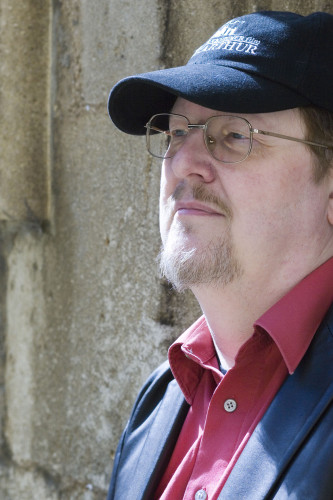
John Matthews
While readers may still associate the self-published book with the untalented or self-aggrandizing writer, times are changing. Self-publishing has now become a very viable option for even the most accomplished and prolific of authors. This mode of production puts the power back into the artist’s hands.
Last week I interviewed one such author – John Matthews. John is an accomplished historian, folklorist, and author. Over the past 30 years he has written over 90 books on Arthurian mythology as well as a volume of poetry and many short stories. His children’s book, Pirates, reached the number one slot on the New York Times Best Seller list in 2006.
John is, without a doubt, a prolific, talented and accomplished writer. This June, he announced the start of a new self-publishing venture. I was able to talk to him about his thoughts on the burgeoning industry and the future of his work.
Heather: To date, all of your books were published by traditional publishing houses. Is that right?
John: Yes. After 40 odd years of publishing I’ve worked with most of the major publishers who specialize in alternative spirituality, mythology, faery lore, etc. Off the top of my head I can think of HarperCollins, Element Books, Inner Traditions, Quest books, Octopus, even the Folio Society. The list goes on.
H: After all this time, why have you decided to move away from traditional publishing to self-publishing?
J: Partly from economic necessity, partly from a desire to get some of our old books back into print, and partly to have some control over the appearance and content of the books.
All of our professional lives my wife, Caitlin, and I have had to contend with editors who felt they knew better than we did, who wanted to change the emphasis of various things, cut things out, amend spellings, and so on. In today’s economic climate, unless you’re Dan Brown or Neil Gaiman, you can’t afford to make any kind of a decent living. So we decided that we would do it ourselves. Fortunately we’ve been aided in this by our friend and colleague Wil Kinghan, who as well as being an incredibly good artist with whom we’ve worked several times, also trained as a graphic designer. His input means that the books will look sensational, and hopefully have very few mistakes. In fact, we think they look a lot better than some of the professional titles released by the big publishing houses.
H: Your new publishing company is called Mythwood Books. Where does the name come from?
J: Mythwood Books comes out of our parent company Mythwood Films, which Wil and I formed five years ago. We got tired of the really poor independent films that were coming out – never mind the blockbusters! – and decided we would try to make our own. We are currently working on our first feature film, The Mermaids, and a couple of documentaries, which we hope to get into production soon. As we had Mythwood Films already set up, it seemed reasonable to create a book production aspect of that. Mythwood itself is a name that I came up with, and which reflects my fascination with mythology and woodlands, those mighty forests where so many great mythical stories are set.
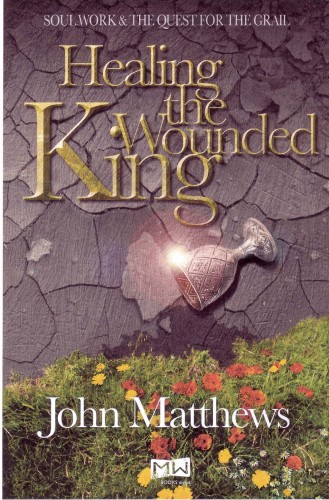 H: You’ve already planned Mythwood’s first book release: Healing the Wounded King. Tell us about this book.
H: You’ve already planned Mythwood’s first book release: Healing the Wounded King. Tell us about this book.
J: Healing the Wounded King is a book I originally wrote in 1997… Essentially it’s about working with the myths of the Grail to promote self-healing.
This all started when I was in United States almost 20 years ago, doing some workshops. Two people came to me in a matter of days with situations that they felt were getting on top of them, and wondered if I had any good advice. As I stood there wondering what to say I felt as though someone had nudged me and whispered in my ear: tell them to meditate on the story of the Wounded King. The Wounded King is one of the guardians of the Grail, who suffers from a wound that can only be healed when the Grail is achieved.
This seemed, indeed still does, such a wonderful metaphor for our need to acknowledge our woundedness and to seek healing in whatever way we can, that I started doing workshops based around this story. They were so successful that I wrote the book. And I’ve got to say that I’ve had wonderful responses from people who use the book and the exercises in it to help them through really difficult times in their life. It’s wonderful to have it back in print again, and have the opportunity to revise it a little and to correct some of the inevitable mistakes that crept in during the process of printing.
H: Will Mythwood be re-publishing all of your old writings?
J: Well, there are a lot of them to do of course! Almost 100. Quite a few are still in print and we’re happy to leave it that way; but the older titles which have lapsed sometime ago, and for which we now have the rights, will eventually I hope be reprinted in this format. The next one that is lined up from our own list is my book on Robin Hood.
H: What about new books?
J: We do plan to do new books in the future. It all really depends on how successful the first few titles are. The more people who buy them, the more chance there will be that we can do new books of our own, as well as by other people.
But I do want to say one thing here, and that is that for the time being, we are only publishing books either by ourselves, or by invitation only. So please, please, if you’re reading this don’t send me your manuscript because if you do I won’t read it and I won’t return it to you unless you send me a stamped addressed envelope. I’m sorry if this sounds harsh but at the moment we are just not set up to be deluged with other people’s work.
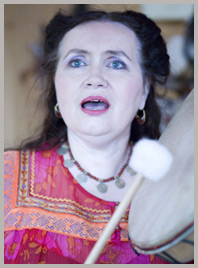 H: What about books from your wife, Caitlin Matthews, another talented and prolific author? Can we expect to see some of her titles? Or your popular tarot decks?
H: What about books from your wife, Caitlin Matthews, another talented and prolific author? Can we expect to see some of her titles? Or your popular tarot decks?
J: Of course we will indeed be publishing many of Caitlin’s out-of-print titles, though I’m afraid we can’t yet run to tarot decks, because those really require physical printing, and not only is that expensive, but there’s also the problem of where on earth you put them – until you’ve sold them out of course!
H: You’ve hinted that you will be publishing other authors through Mythwood Books. Can you tell us who?
We do intend to produce books by other writers. I can tell you here, and this is an exclusive, that we are going to be publishing a series of novels by Dwina Gibb, wife of the late Robin Gibb of Bee Gees fame. Dwina is a wonderful writer and has written several novels in the past, including two epic retellings of the life of the Irish hero Cormac. We hope to reprint these as well, and then to go on to do the third and final part which she is currently writing.
There are some other possibilities as well, but I can’t really talk about these yet until we have contracts signed. What I can promise you is that we have some wonderful books lined up, by some extraordinary authors.
H: Let’s go back to the self- vs. trad- publishing debate. Weigh the pros and cons of the two.
J: The pros of course are that you have control over what goes into print, though this can have a downside, which I’ll come back to in a minute. The other good thing is that you get to keep most of the money that comes in from purchases. If you think that with an average publisher the very highest royalty that you can get is 12%, we can offer our authors 60%. And that is of actual money received, not percentages of percentages, as you get from so many regular publishers.
The cons are that if you intend to do it yourself it is quite labor-intensive and unless you are very computer savvy can take quite a long time to fathom out all the different formatting problems. The other con goes back to the idea of being able to publish whatever you like. This means, unfortunately, that a lot of shall we say less than wonderful books get out there. They may have nice covers, interesting titles, and they may have an interesting topic; but they can be badly written and full of typos. That’s why you need an editor…
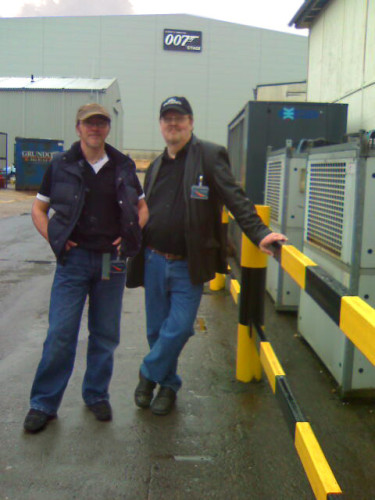
John Matthews and Wil Kinghan
But there is still one thing which I personally find annoying, but which is at the moment anyway, inevitable. There is a certain stigma around publishing your own work. There will always be people out there who will say, “Well, it can’t be very good then, or he or she would have published it with a proper publisher!” There’s not much we can do about that, though the proof of the pudding is in the eating. In time I think people will realize that a great deal of really good work is coming out from smaller companies or self published authors.
And there’s no getting away from the fact that you can make a lot of money this way. I’ve heard of people earning as much as $10,000 a month from their self published books. Of course these tend to be very popular subjects, mostly fiction, and the people in question usually have a couple of dozen books out there. Even if you’re only getting 60% of say $5.95 it soon adds up.
H: Are there any other limitations to self-publishing?
J: I don’t think there are any limitations providing you have the time and energy and the know-how to format your manuscript. That can require a lot of learning if it’s going to be done properly. But you have to start somewhere. We’ve just been very patient, and taken our time, and made every effort to ensure that every book that Mythwood Books produces will be the best it can be, will look great, and will read on just about every platform out there. That means not only all the Kindle devices, but Nook and a few others I can’t remember at this moment. Each one requires different formatting, to make it read properly, so you can imagine the time that takes.
H: Will your books only be available via eBook?
J: For the moment, yes. But once again this depends on the success of the e-book venture. But if it does well, and that is very much in the hands of the people out there who know us and like what we do, then we are hoping to move to print on demand at some later date.
H: Where can we go to find out more about Mythwood Books?
J: We are just in the process of setting up our website at the moment. So if you go to www.mythwoodbooks.com in the next few weeks, you will be out to find out about current and future publications.
If all goes well, the first book, Healing the Wounded King, will be on sale from Amazon, Barnes & Noble, and various other sites in the next 2 to 3 weeks. And of course from our own site also. We are planning lots of extra content, including audio files and other exciting giveaways. But don’t expect those too soon because we are still just starting out. So we hope everyone will check them out, and we love it if you bought one, but above all please tell everyone who might be interested because that’s the only way Mythwood Books will be a success.
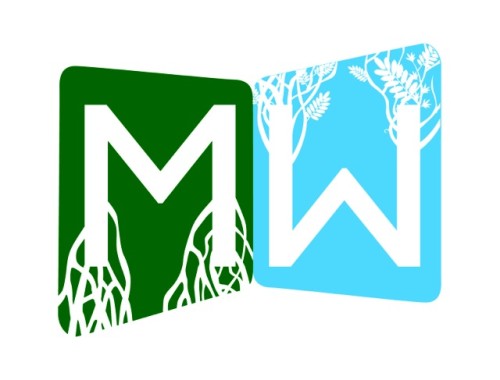
Mythwood Books New Logo
H: Thank you, John, for sharing your thoughts on the self-publishing industry and the details about your new adventure. Good Luck as you embark on this new chapter, so to speak, in your own story and career.
After our initial interview, John contacted me to share the latest news from Mythwood. Early in 2014, he will be publishing “the eagerly awaited autobiography of much loved TV, Stage and Screen actor Mark Ryan.” Hold Fast, penned by both Mark and John, tells Mark Ryan’s “extraordinary story from Robin of Sherwood via Transformers to the forthcoming TV show Black Sails.” Hold Fast will be published to coincide with the first season of the new pirate-themed show on Starz.
John is certainly proving the nay-sayers wrong and taking self-publishing to an impressive level of achievement and quality. I’m sure we’ll be hearing more from him over the next few years as he and Caitlin republish and released their writings under the new Mythwood name.
The Wild Hunt is not responsible for links to external content.
To join a conversation on this post:
Visit our The Wild Hunt subreddit! Point your favorite browser to https://www.reddit.com/r/The_Wild_Hunt_News/, then click “JOIN”. Make sure to click the bell, too, to be notified of new articles posted to our subreddit.
While I have a great deal of respect for John Matthews, I personally believe he may be oversimplifying the benefits of self-publishing. As Heather noted, two years ago “43% of all paperbacks were self-published.” What she didn’t note was how few of them make any money at all. This is because self-publishing replaces everything the publisher did, including promotion, advertising, marketing, etc. Publishers have distributors and can get their books into bookstores and chains. How will you, the self-publisher, accomplish this? Someone making $10,000 a month is news because it happens so rarely. A person with the stirling reputation of John Matthews is likely to have far greater success than someone who is unknown. His history and reputation forms his marketing.
There are other costs associated with self-publishing, ranging from cover design and artwork to editing—and if you’re a writer and don’t think you need to be edited, I would respectfully suggest that your ego is in the way of your success.
If you are new and decide to self-publish, I would suggest that you should not think in terms of, “I’ve finished the book, now I can wait for my royalties!” Rather, that is when your work really begins. You should spend as many hours as possible promoting your book through blogs, interviews, publicity, advertising, etc. The more you put in, the more you’ll get out.
I agree with Mr. Matthews that it is a shame that self-published books have a reputation for not being able to be published through a “real” publishers. Many self-published books are wonderful.
But the fact is, the majority of self-published books are, uh, less than stellar. As always, caveat emptor. Just because a book is published doesn’t mean it’s good.
I also agree with Mr. Matthews that it is possible to make a lot of money through self-publishing. I do not think traditional publishing will end, but it, like everything else, will evolve.
“Publishers have distributors and can get their books into bookstores and chains. How will you, the self-publisher, accomplish this?”
Through Lightningsource (part of ingram) which distributes to the major stores and allows you to set an appropriate wholesale discount. Self-pubbers are already doing this, although it makes more sense for them to scrap the idea of going into stores, dropping their wholesale discount to 20% and selling through Amazon instead.
“This is because self-publishing replaces everything the publisher did, including promotion, advertising, marketing, etc”
i’ve got two words for you: “Robert” and “Galbraith”. As a first time indie author, I sold more copies of my debut novel in 1 month than Ms Rowling’s “Cuckoo’s Calling” sold in 4. What kind of marketing is that, exactly? A handful of hardbacks and a couple of planted reviews does not a marketing strategy make. If publishers treat all new authors like this, I’m not surprised everyone is making a go of it themselves.
Otherwise, I completely agree with both comments – if you self-pub properly (like these guys clearly are) there is zero downside, other than putting the money up for editing and cover design yourself, which, In the long run, is a welcome trade for 70% royalties instead of 12%.
Just out of curiosity, Nick, how many have you sold and how do you know how many Cuckoo’s Calling has sold?
And just because Ingram distributes to major stores does NOT mean major stores are ordering self-published books and keeping them on their shelves. Sure, they can order them if a customer asks for them, but they don’t start off by buying a thousand copies to put in all their stores to see how it sells. It is only the rarest cases, when a self-pubbed book explodes in popularity, that a bookstore will actually order copies to have on hand. And having copies in bookstores is actually still a really good way to sell books. (Just saw an article about how B&N going under would actually be bad for Amazon, as people wouldn’t be able to browse, using their bookstores as a “showroom” anymore.)
I sold around 1,200 in the first 30 days following a big marketing push – CC sold around 450 since its release in April according to The Guardian (out of 1,500 units stocked).
Very true on your points – some self-pubbers are going for stores, and I know a few who get stocked, but its far from the norm. But then, it’s hard to get bookstore sales without being on the front shelves, which only tends to happen if you’re an established name – so any new author is unlikely to see much of a benefit there, and the choice often comes down to either Amazon or Bookstores when calculating how to set your discounts (eg, I woudn’t opt to lose money by setting a higher wholesale rate knowing I’d get better unit sales online). Some might, for whatever reason, but I wouldn’t personally.
Don’t get me wrong – I love bookstores and browsing for print books, and I also love the convenience and price of Kindle – two very different markets, and a lot of traditional publishers aren’t exploiting the digital model nearly as well as a lot of independent authors are doing – and not just the big names!
Thanks, Nick. According to the Telegraph, “The publishers said The Cuckoo’s Calling had sold some 1,500 copies in hardback, but figures compiled by Neilsen Bookscan [sic] suggest that the number bought from British retailers was actually 449.” I have to correct the Telegraph here. Nielsen Bookscan is a compilation of cash register sales from select booksellers (most of which are chains like B&N). Most independent bookstores’ sales figures are not actually included in Bookscan numbers. Nor are ebooks. Therefore Bookscan numbers will always be less than the number the publisher has actually sold. (I don’t know if you are counting your ebook sales as well into your 1,200 sales number, but we can’t compare those to hers because Nielsen does not track ebook sales at all.)
In addition, she had another 500 of Bookscan sales through American retailers (before the news broke). According to Publishers Weekly, they had an initial print run of 10,000, indicating they were very confident of this release, and now that the secret is out they are scrambling to do an exponentially larger printing.
That said, whenever possible I would still go with a traditional publisher over LightningSource or BookSurge. If I look you up on Bookscan, I only see 4 cash register sales. That is how many were sold through “regular” stores that contribute to Bookscan tracking. Publishers and other industry insiders look at these numbers to gauge whether they want to do future business with a person. If you are content to stay with self publishing, then it really doesn’t matter, but unfortunately some people think self-publishing will lead to a real book contract. It won’t, if out of all their sales only 4 of them show up in Bookscan.
Yes, 99.9% of sales so far for me have been ebooks – and if CC’s performance is indicative of a normal debut author’s performance through publisher channels, I’m glad I never sent out any query letters! Many authors still strive for a publishing deal, but more and more are realising they can get similar or better performance handling things themselves – at least, in terms of digital sales. Print sales still rely on developing an author brand and offline publicity, which is a lot harder without a publisher – though it builds over time.
At the end of the day, as far as we’re concerned, it’s about money in our pockets – also worth bearing in mind, our royalty rate as indie authors is 70% (on a $2.99 ebook this is $2) compared to an average of $0.20 – $0.30c for a published author selling in paperback at $11.99 – and not much more than that for hardcover.
Obviously, things have changed a little since the weekend, but for any debut author with that performance, it’s unlikely they’d land a second book deal.
Lightningsource isn’t a publisher – they’re just a printer / wholesale channel.
I don’t know, “that performance” is not too shoddy. It shows a book well on its way to having decent numbers by the end of a full year period. And since we can’t see digital books in her numbers, but know that especially in mystery they will be a very good portion of sales, I have every confidence this is the type of author a publisher would sign up again, carefully working with them to build their platform and get their name out. Sure, it’s not stellar, but hardly anyone starts out as a bestseller overnight. Some publishers still have the patience and foresight to nurture good authors.
And those royalty rates really vary from genre to genre; what you quoted seems exceedingly low, in my experience.
Anyway, I get both sides of the story – control, more money (out of whatever money the book makes), no inventory, etc. vs. better distribution (which I think can lead to better book sales in most cases), reputation, professional handling of editing, cover, and marketing materials. It really depends on what the author wants to accomplish. As I said before, as long as people don’t view self-publishing as an entree or prerequisite to traditional publishing, it can work out for all involved. Well, except the reader. I think you have to be a savvy consumer in order to not waste your money on books that are poorly written or edited, with the glut of books currently on the market. And yes, that goes for traditionally published books as much as for self-pubbed books, but I think (based on experience) you’re taking more of a gamble on the self-pubbed ones.
I was basing that on a 12% royalty – Here’s some figures from the horse’s mouth (so to speak): http://jakonrath.blogspot.co.uk/2012/05/harlequin-fail.html
Agreed, any book needs to be well crafted and produced to have a hope of doing well, but the business decision boils down to this: do I sign away copyright in return for a $6k advance and pennies per copy (if I even earn out that royalty, which is getting less and less likely – around 80% don’t)… or, do I self publish, earn $2-$4 per unit and keep control for life? A lot of that comes down to what authors are looking for, as you mentioned.
The chances of succeeding at either depend on a huge number of variables, but I know where I’d be leaning personally. But then, I have no dreams of a publishing contract – that’s very important to a lot of people, so perhaps it’s worth it for them. It’s a gamble either way, but it’s a mistake to think a publisher is going to do much marketing for a debut author – the money involved in securing premium shelf space is just too much of a risk.
Anyway, (not wanting to hi-jack the comments section too much) I think these guys will do well and definitely made the right decision 🙂
And I’ve enjoyed the debate!
Thanks for your contribution to the discussion. I agree with your point on publicity. Having experience in book publicity, I know how difficult, and expensive (and often undervalued) it is for the unknown writer. John has a leg-up on that with his built in fans. However, I have also heard from multiple authors that the publicity and other perks offered by traditional publishing are quickly falling away as Publishers evolve to compete with the self-publishing market.
Either way…the bottom line is publishing is work for the author. As John said. You get out what you put in.
I will have more posts on this topic coming down the line.
That Daily News story refers to books published. I daresay an analysis of books sold would be much more informative. And I say this as someone who operates a small business which is, in essence, self publishing (albeit in gaming, rather than fiction).